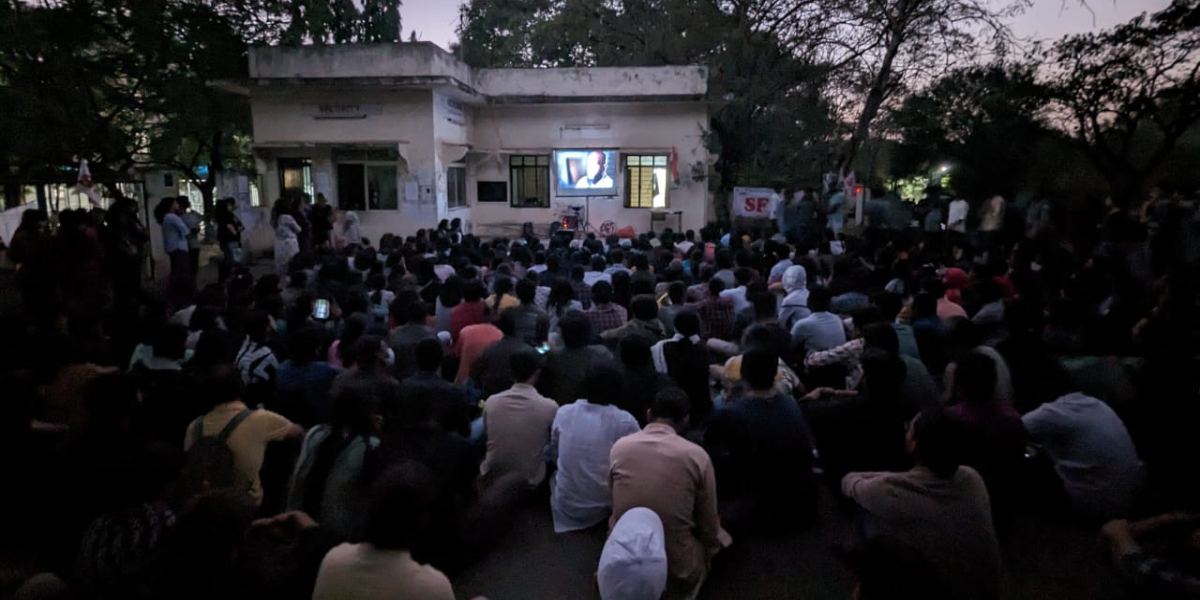
Students at the screening of the documentary at Hyderabad Central University. (Supplied)
The Centre’s attempts to block a BBC documentary on Prime Minister Narendra Modi and the 2002 Gujarat riots, as well as the pushback against those attempts, especially on university campuses, has finally reached the Supreme Court.
The apex court on Monday, 30 January, said it would hear a bunch of public interest litigations (PILs) challenging the Union government’s decision to block the documentary on 6 February.
A bench headed by Chief Justice DY Chandrachud took note of the submissions of lawyer ML Sharma, as well as senior advocate CU Singh, who is appearing for veteran journalist N Ram and activist-lawyer Prashant Bhushan, seeking urgent listing of their separate PILs on the issue.
Lawyer Sharma, who filed a PIL in his personal capacity, mentioned the plea and sought urgent hearing.
“It will be listed on Monday (6 February),” the bench, also comprising Justices PS Narasimha and JB Pardiwala, said.
“People are being arrested. Please list it urgently,” Sharma told the bench.
“You can speak to social media from elsewhere. It will be listed on Monday,” the bench said.
Senior advocate CU Singh mentioned the separate plea filed by N Ram and Bhushan. He made a mention of tweets by N Ram and Bhushan being deleted allegedly by using emergency powers. He also said students in Ajmer were rusticated for streaming the BBC documentary.
“We will list,” the CJI said.
Sharma filed the PIL against the Centre’s decision to block the documentary, alleging it was “malafide, arbitrary and unconstitutional”.
The PIL also urged the Supreme Court to call and examine the two-part BBC documentary and sought action against persons who were responsible and involved directly and indirectly with the 2002 Gujarat riots.
Sharma in his PIL he has raised a constitutional question and the top court has to decide whether citizens have the right under Article 19 (1) (2) to see news, facts and reports on the 2002 Gujarat riots.
He has sought a direction to quash the Information and Broadcasting Ministry’s order of 21 January, terming it as illegal, malafide, arbitrary and unconstitutional.
The plea claimed the BBC documentary has “recorded facts” which are also “evidence” and can be used to further the cause of justice for the victims.
On 21` January, the Centre issued directions for blocking multiple YouTube videos and Twitter posts sharing links to the controversial BBC documentary India: The Modi Question.
As the Union government sought to curb the screening of the BBC documentary India: The Modi Question, college and university students across the campuses pushed back by showcasing it using their own means and in new ways.
After the Central Executive Committee of the Student’s Federation of India (SFI) called for nationwide screening of the documentary, Hyderabad Central University screened it on campus — for the second time.

Five SFI members were injured in clash over the screening of the BBC documentary in Pondicherry University. (Supplied)
The documentary was also screened at the English and Foreign Languages University (EFLU) in the city and at Presidency college in Chennai.
While the screenings have been largely peaceful, five people were injured in a clash between activists of the ABVP, the student arm of the RSS, and students showing the documentary in Pondicherry University.
Attempts to screen the BBC documentary at the Jawaharlal Nehru University and Jamia Millia Islamia in the national capital were thwarted by the university authorities and the police.
Meanwhile, the SFI and the Democratic Youth Federation of India (DYFI) organised screenings of the documentary in several campuses across Kerala.
The Congress party in Kerala, too, held a public screening of the documentary on the Shanghumugham beach in the state capital Thiruvananthapuram.
The first episode of India: The Modi Question, released on 17 January, alleged that a team sent by the British government to Gujarat in the wake of the post-Godhra riots of 2002 had held that then chief minister Modi was “directly responsible for a climate of impunity” that led to the violence against Muslims.
The Centre, on Friday, 20 January, invoked emergency powers and directed YouTube and Twitter to remove links to the documentary.
Free speech activists have since been played a cat and mouse game with the Centre by forwarding links to the documentary on various other platforms.
Meanwhile, The Caravan magazine obtained a copy of an inquiry conducted by the British government, which was cited in the BBC documentary. According to the report, the violence was “planned, possibly months in advance” by the right-wing Hindu group Vishwa Hindu Parishad (VHP).
The report said: “The attack on the train at Godhra on 27 February provided the pretext. If it had not occurred, another one would have been found.”